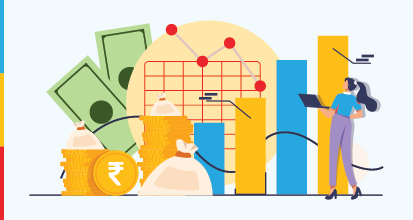Written by : Knowledge Centre Team
2022-08-02
871 Views
Share
In a market economy, prices for goods and services keep changing. Some prices whereas some fall. The impact of inflation is seen when there is a broad increase in the prices of goods and services. It implies you can buy less for Re. 1 today than you could do yesterday. In simple terms, inflation reduces the value of the currency over time.
Inflation can also be calculated for specific goods, such as clothing, or services, such as a facial at a salon. Whatever the scenario, inflation represents how much costlier the goods and/or services have become over a certain period.
If you were to ask any common person in India what is the single biggest pain point, the answer would be – inflation. It is obvious because you feel the impact of inflation in almost all corners of your life. The prices of the most important items in a family’s budget – food items – have been rising for the past several years.
A loaf of bread that cost Rs. 5 in the 1990s now costs ~ Rs. 45. Whereas, petrol is breaching all limits of imagination. You could buy petrol at Rs. 9 a litre in Delhi in the ’90s. The same Rs. 9 will fetch less than 1/10th of a litre today. This price increase is explained through a concept termed Inflation.
Also Read - Inflation Meaning
Sometimes inflation is high, and at other times it hardly garners attention. The short-term changes do not create major issues. The real havoc is created by long-term inflation. Over the long term, inflation erodes the purchasing power of your money. Even if you are saving and investing diligently, your money buys less with time. If you procrastinate savings, you are impacted even more.
The bottom-line: The buying power of your money goes down with time. To ensure your hard-earned money does not lose sheen, it must grow faster than the rate of inflation. The current rate of inflation in India is estimated to be around 7%. If you invest in financial instruments that will grow your money at the rate of 8%, you may be able to keep pace.
For example: If you think that you will have Rs. 1 Crore in your kitty after 10 years, you must do a quick back-of-the-envelope calculation to find its true worth. The 1 crore after 10 years is actually worth ~Rs. 49 lakhs today.
Similarly, if you invest Rs. 1 Crore in a financial instrument that gives a return of say 7%, you will have a kitty of ~ Rs. 3.86 Crores at the end of 20 years. At an average 7% rate of inflation, the real growth is zero. To make things worse, you will end up paying taxes on the interest component. Forget making profits, you will end up incurring losses.
Must Read - How to Invest Money?
Investing in asset classes that give inflation-beating returns is ideal. However, instruments barely beating inflation may not be a good fit if you are aspiring to generate wealth. Here is a list of investments that can help you beat inflation:
1. Gold: Gold is considered a good hedge against inflation—increasing in value as the purchasing power of the rupee declines. Prices of yellow metal increase during times of high inflation. Though gold investments look attractive, investing in gold also has opportunity costs.
When inflation is high and interest rates are increased, the opportunity cost of holding gold also increases. In addition, there are several disadvantages if you are considering investing huge amounts in gold. The risk of holding so much physical gold is high besides the cost of safe storage.
Learn if investing in gold is a smart choice.
2. Real Estate: Real estate is a highly illiquid investment. It is a good bet if you intend to stay invested for the long term. Although real estate has been a promising sector for the last few decades, several factors affect the prices. The city, locality, last-mile transportation, infrastructure, industry, government notifications etc impact the current and future values of the property. You may not be able to sell off or let out a property if you need money at short notice.
3. Equity: Investing in stocks helps generate wealth. If you are young and just starting your investment journey, equities are highly recommended.
Saving and investment plans are important. However, what is more, important is investing in the right asset classes and financial instruments. Your investments should not only beat inflation but help you create wealth. Keeping an eye on taxation is critical else the benefits will be eroded by taxation. Tax rebates on investment and maturity will save considerable money. Efficient and effective investing is the need of the hour.
Disclaimer: This article is issued in the general public interest and meant for general information purposes only. Readers are advised to exercise their caution and not to rely on the contents of the article as conclusive in nature. Readers should research further or consult an expert in this regard.
We bring you a collection of popular Canara HSBC life insurance plans. Forget the dusty brochures and endless offline visits! Dive into the features of our top-selling online insurance plans and buy the one that meets your goals and requirements. You and your wallet will be thankful in the future as we brighten up your financial future with these plans.




